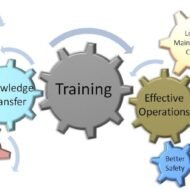Posted by Managementguru in Principles of Management, Training & Development
on Feb 22nd, 2014 | 0 comments

Benefits of Training to Employers The employers invest in training because they secure several benefits out of the exercise, which can be summed up as under: Faster learning of new skills Training aids the employers to lessen the learning time of their employees and accomplish higher standards of performance. The employees need not waste time in learning by observing others. If a formal training programme exists in the organization, the qualified instructors will help the new employees to acquire the skills and knowledge to do specific jobs quickly. Increased productivity Training increases the skill of the new employee in while performing a particular job. An increased skill level usually helps in increasing both quantity and quality of output. Training can be of great help even to the existing employees. It helps them to increase their level of performance on their present job assignments and prepares them for future assignments. Standardization of procedures Training can help the standardization of operating procedures, which can be learnt by the employees. Standardization of work procedures makes high levels of performance rule rather than exception. Employees work intelligently and make fewer mistakes when they possess the required know-how and skills. Lesser need for supervision. Trained employees need lesser supervision. Training does not eliminate the need for supervision, but it reduces the need for detailed and constant supervision. A well-trained employee can be self-reliant in his/her work because s/he knows what to do and how to do. Under such situations, close supervision might not be required. Economy of operations Trained personnel will be able to make better and economical use of the materials and the equipment and reduce wastage. Also, the trained employees reduce the rate of accidents and damage to machinery and equipment. Such reductions can contribute to increased cost savings and overall economy of operations. Higher morale The morale of employees is increased if they are given proper training. A good training programme shapes employees’ attitudes towards organizational activities and generates better cooperation and greater loyalty. With the help of training, dissatisfactions, complaints, absenteeism and turnover can also be reduced among the employees. Thus, training helps in building an efficient and co-operative work force. Managerial Development The top management can identify the talent, who can be groomed for handling positions of responsibility in the organizations. Newer talent increases the productivity of the organizations. By providing opportunity for self-development, employees put in their best effort to contribute to the growth of the...


